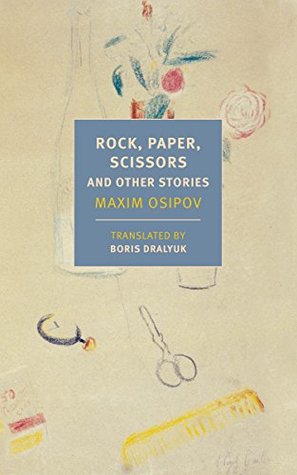
In “Rock, Paper, Scissors,” we meet a new Russia: one that stands with one foot in the recent Soviet past, one foot in the more distant past of Pushkin and Lermontov, and, well, a third foot in the Millennial post-Soviet present. And maybe a fourth foot in the West.
Like Chekhov (and Bulgakov), Maxim Osipov is a doctor by training and trade, and there’s definitely more than a hint of Chekhov in these stories. They mainly feature people of the intelligentsia class: doctors, theater directors, and the like. Although several of the stories are set in or around hospitals, these are not primarily medical tales, but tales of small-town Russian life before and after the collapse of the Soviet Union. For the older characters, the USSR is a matter of ambivalent nostalgia; for the younger ones, it’s a story told by their parents and grandparents. The Soviet Union, everyone agrees, had its flaws, but the current system does too. Several of the characters believe that things will be much better in the West–but those that actually go to Germany or the US are underwhelmed by it. Religiosity in this new Russia is everywhere, but actual faith seems distinctly lacking.
The writing is elegant and slightly spare in that Chekhovian style, and the translations do it justice. The book is well-edited (not a given with these publications of contemporary Russian literature) and has a number of useful footnotes explaining the Russian cultural references that the characters keep making.
The tone of the stories, as is often the case with Russian literature, is elegiac and slightly melancholy, with that undercurrent of brutality that so much contemporary Russian literature possesses. Indeed, American readers may be taken aback by the frank discussions of things such as abortion, sexual assault, random shooting, and suicide, all of which are described in matter-of-fact, non-judgmental tones.
If you haven’t read any contemporary Russian literature, or any Russian literature at all, “Rock, Paper, Scissors” may leave you a little confounded, but that would be the case for almost any work of Russian literature you pick up, and this one is easier reading than most, so it’s a good place to start. If you’re a long-time aficionado of Russian literature, “Rock, Paper, Scissors,” with its contemporary subject matter and clear links to its classical predecessors, will be a welcome addition to your library.
Buy it at Barnes and Noble or Amazon.
I’m sure it would be a welcome addition to my library 😊 I’ll definitely look out for Osipov!
LikeLiked by 1 person
Very much worth it! I think there was a review of his stories in the Washington Post or something recently.
LikeLiked by 1 person
Good! I look forward to discovering him. I really enjoyed Boris Dralyuk’s translation of Babel. As you probably know, he blogs too: https://bdralyuk.wordpress.com/ 😊
LikeLiked by 1 person